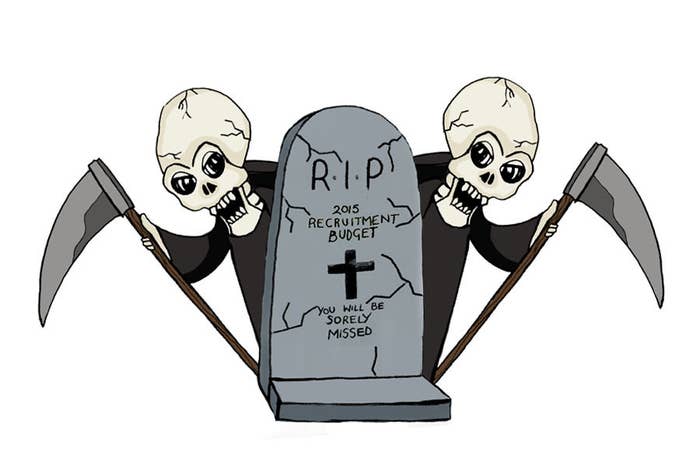
1.Be Demanding
And the award for the best way to put off world-class candidates goes to…THE DEMANDING JOB COPY. Don't be ridiculous, be realistic. You probably aren't going to find a Web Developer with Brand Marketing experience, from a farming industry background, who speaks native Bengali and is based on the Isle of Mull. However, if you do find a person with this kind of experience I would definitely like to see their CV!
2.Words. Lots of words…and paragraphs. More words. Paragraphs. Maybe some numbers too? Few more words. WORDS!!!
There is nothing worse for budding jobseekers than opening the link to what looks like an exciting role, only to be greeted with an eyesore of unnecessary wordy text, which more than likely has absolutely nothing to do with the job that is on offer. Keep introductions short and concise and only list the main responsibilities of the role when describing the opportunity. You don't need to bombard candidates with an entire job description - you want to be at least a tad mysterious or it's no fun for anyone!
3.Be as vague & mysterious as possible
There's curiously mysterious (we all love to play hard to get) and then there's just down right vague. You've got to give these guys something to work with or you simply will not get the applications you want. Recruitment Consultancies are particularly guilty of this. They then wonder why they don't get any decent applications if any at all! A little effort goes a long way.
4.Leave off all benefits/perks
It's amazing how many employers fail to see the advantages to listing their benefits packages on their adverts. This is your one chance to set yourselves apart from all of your competitors – the same competitors who are probably looking for the same exceptional candidates as you are - so make the most of it! When we receive job copy, I would estimate that the benefits package is completely ignored around 85% of the time, which is absolutely staggering!
5.Nonsensical Job Titles
As part of your candidate repulsion strategy, the Nonsensical Job Title should be top of your list in the job copy stakes. If you are looking to attract the right candidates, don't advertise ridiculous internal babble-based job titles because no one is going to type "Digital Overlord" into Google when looking for a Web Manager role. As nice as it is to have these quirky job titles, for search purposes in particular, I would advise against advertising solely with these. Similarly, I see a lot of job titles which make absolutely no sense in relation to the advert. Studies have shown that 40% of respondents regularly see job titles they don't understand and almost two thirds (64%) say that this puts them off applying for the job. If a candidate doesn't understand the job title, they probably don't fancy wasting their time reading the rest of the ad.
6.Include Speling misteaks, grammatical errors and heaps of Business Jargon
Studies show that 57% of candidates would be put off applying for a role if the advert was full of jargon- with 3 in 5 candidates finding it annoying. Many people include jargon because they think it makes the advert sound cutting edge and super cool. It doesn't.
Quite frankly, spelling mistakes and grammatical errors are just embarrassing (the spelling mistake in the heading is purely for dramatic effect!). If you use Microsoft Office there really is no excuse. If you are writing the job copy on your phone, you may as well just give up now.
7.Undersell the job & company with boring job copy
In the same way that missing off perks and benefits could have a huge impact on low/bad applications, so could writing a coma-inducing job advert. This is YOUR CHANCE Recruitment Managers! Your chance to change the world and sell your company as the best thing since sliced bread hit shop shelves in 1928! A job advert is supposed to engage and excite the reader. Investors in People Award? PUT IT ON THERE! A study by CRF has shown that candidates favoured job adverts that included an accolade of the company as a good employer. It also indicated that their impressions of companies that carried such seals were more positive. You are supposed to be ATTRACTING talent. This is particularly important if company culture is a priority (which it really should be). An exciting advert will attract someone with a zest for life! A boring advert is fine if you're looking for the next office wallflower.
8.Don't include any essential criteria
Recruiters who are attempting to write vague adverts in the name of good old client confidentiality often miss this very important section off their adverts. This is job ad suicide. Yes you can be too specific (see point 1), but if you don't outline the essential criteria for your role, you aren't going to generate the talent you need to succeed! This doesn't need to be more than a few points, but those few points could spell the difference between filling your vacancy and looking desperate for candidates 6 months later.
9.It's cool to leave location out so make sure you don't include it!
This is VERY important! If you don't provide a location, candidates will not know where the role is based (am I Einstein in the making?). This has an impact for a number of reasons:-
(a)The role may be commutable from locations that you haven't even thought to search for candidates.
(b)If your role is in an awkward location but you offer work from home days, candidates from even further afield may consider a longer commute a few days a week.
(c)I wouldn't apply for a job that didn't state the location. Would you?

